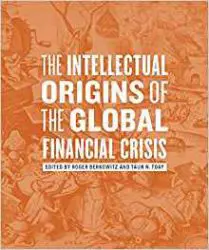
Drucilla Cornell, “Can There Be a People’s Commons?”
Cornell, Drucilla. “Can There Be a People’s Commons?: The Significance of Rosa Luxemburg’s Accumulation of Capital,” in The Intellectual Origins of the Global Financial Crisis, edited by Roger Berkowitz and Taun Toay. New York: Fordham U. Press, 2012
Review by Hayyim Rothman
In this article, philosopher Drucilla Cornell explores the long-lasting effects of imperialism and capitalism in order to look for spaces of resistance to those forces. She roots her analysis in South Africa, suggesting that it is possible to overcome exploitative conditions by fostering communal forms of resistance to the harmful effects of capitalism.
Cornell draws on Rosa Luxemburg’s analysis of primitive accumulation in order to understand apartheid in capitalist terms. Luxemburg argues that capitalism fuels itself on pre-capitalist economies, sustaining itself by violently exploiting those “outside” of capitalism as sources for the accumulation process. Historically, colonialism and invasions of pre-capitalist societies have created new markets for capitalists and provided inexpensive labor, thus driving profits, while spreading capitalism itself. Luxemburg held that when capitalists succeed in transforming all of these “outside” targets into insiders, capitalism will self-destruct. For Luxemburg, then, imperialism is the necessary engine of capitalist accumulation, but also its limiting factor.
Instead of looking at the global level, Cornell examines the case of apartheid within South Africa to understand the capitalist process of violent exploitation. In South Africa, unfree black labor served as Luxemburg’s “outside.” The violence of the state allowed for a process of internal super-exploitation that deeply transformed the country. Because of this transformation, decolonization is nearly impossible, because even after a colonial power withdraws (or, in the case of South Africa, apartheid legally ends), the economic relations left behind are fundamentally tilted toward capitalism.
When apartheid was legally abolished, Cornell argues, the social relations of production associated with imperial domination left little alternative to capitalism for South Africans, particularly black South Africans. In fact, the violence and exploitation inherent to apartheid entrenched capitalism in South Africa by fostering the consumption of cheap mass-produced goods and destroying any alternative economic system. As a consequence, Cornell claims, capitalism reproduces the social relations of apartheid long after the system itself has ceased to exist.
The only way to overcome these effects, Cornell suggests, is to foster sites of resistance such as a people’s common. That is, the legal end of apartheid does not alter the dominant social relations, nor does it provide an alternative economic structure. Communities must continue to resist exploitative social and political structures. Cornell examines alternative economic spaces in South Africa, concluding that the reversal of imperialist capitalism, even through communism, can produce a deeper form of democracy.
This application of Luxemburg’s imperialist capitalism model provides an in-depth look at the ways exploitative systems shape and transform societies, and suggests a possible site of resistance.
Return to the reviews or the annotated bibliography
Hayyim Rothman has a PhD in Philosophy from Boston College and recently received a Fulbright postdoctoral research fellowship to work at Bar Ilan University in Israel.